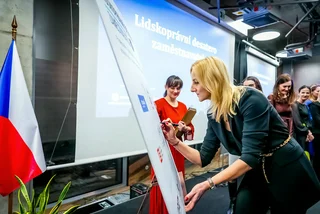From the customer’s perspective, banking has become increasingly accessible and user-friendly in the digital age. Actions which would previously have required going into a bank branch can now be performed at home with the touch of a button. Yet behind these slick user experiences are sprawling, complex organizations which are constantly seeking to innovate within a strict regulatory environment.
Markéta Cechman, Executive Director of Shared Services and Operations at ČSOB, plays a leading role in the transformation of operations at one of Czechia’s biggest financial groups. Expats.cz sat down with Markéta to discuss digitalization, financial education, and the need for large organizations to take social responsibility seriously.
How has digitalization changed the work that you do in your shared service centers?
None of us can stop progress. Especially in shared services and operations, we are used to the world changing through constant innovation and new technologies. It’s in our DNA.
We have around 300 people in a shared services center in Hradec Králové and 250 here in Prague. We process hundreds of tasks from the CSOB Group broad product and service portfolio, including controlling and reporting functions. Now, we increasingly focus on judgment-based work, taking on new agendas and updating our skills. Repetitive admin agendas were replaced by smart technology, but we will always need experts for dedicated fields.
We started digitalization ten years ago, digitalizing 90 percent of our customer documentation. We later started seriously with robotization and automation. We constantly seek to replace jobs that disappear with new, more sophisticated agendas.
Do these jobs require a higher educational level than before?
Different skills are needed. Two years ago, we started a program in Hradec Králové to retrain 150 people with digital and IT skills. Transparent and frequent communication is vital, supporting our colleagues to reskill and also motivating them to continuously work on themselves.
We need people who understand technology and can dream up innovations. We’ll also always need expert know-how. When there’s a process change or a new rule given by the state, we have to adjust, so we need experts who know exactly what the outcome should be.
I’m very proud of our team of Process Managers – what I call our “family silver” – who go from department to department and look for improvements. As new technologies give us new potential, they are dedicated to exploring these opportunities.
We also have innovation platforms within our departments, through which people can send in ideas. No idea is a bad idea. Anybody can participate; our Process Managers evaluate their ideas, and some of those ideas are successfully deployed.
Are your people optimistic about automation and new technologies?
Some people are reluctant to retrain, but most accept that we cannot avoid change if we want to keep delivering a great service for customers. Our customers expect instant and excellent service, which is why we have to continuously improve. In Hradec Králové, our reskilling program led to 50 people becoming testers as part of a new “testing hub.” Reskilling offers colleagues rich career paths. Self-motivation is key, but we give people the opportunity to change their life and have a good, future-looking job within ČSOB.
Is ČSOB exploring Artificial Intelligence and its application in operations?
There is huge hype about AI right now, but we have been using it in our processes for years. We use AI, for example, in fraud detection in order to protect clients, and it’s also used to process claims and notary requests. Another interesting innovation is our virtual assistant called Kate. You can give Kate instructions and ask her questions to help manage your finances. Kate is still learning and improving, like any AI technology.
Generative AI gives us the potential to use AI even in processes where it wasn’t possible before. It is the next level of process automation. At the same time, banking is all about trust. AI is a great tool, but it can be misused just like any other great invention. We have to be extremely careful about data security, and that’s why our implementation of AI may be slightly slower than in some other industries.
How are your customers responding to technological changes?
I think Czechs are dealing well with these changes. Covid changed our behaviors so much – people who had never used mobile banking were forced to live in a virtual world. It was the fastest possible driver for digital transformation.
We also focus on finance and cyber-literacy education. We have a program involving around 600 of our employees who teach children from first grade to the end of high school. I love this initiative; it’s so nice to get away from everyday issues and meet the students. It’s also wonderful to see how education has changed since I went to school; kids aren’t afraid to ask questions, and they can have a great dialogue.
Some changes will always be difficult for certain parts of the population to adapt to. That’s why we still have bank branches open across the country. In these branches, we increasingly use the opportunity to educate visitors about online and mobile banking so that next time, they might be able to do it themselves.
What topics do you cover in these school sessions?
Schools can decide what topics they want to cover – whether it’s financial literacy, cyber-security, or sustainable economy. It also depends on the age of the children. With younger kids, we incorporate games and might teach them how to set up a family budget, for example, showing them that you shouldn’t spend more than you earn and that it’s smart to have some savings set aside “for a rainy day”.
Cyber-security education is vital; I see everyday how criminals always find ways to trick people. Alongside our school program, we cooperate very closely with the Czech Police on this issue, running campaigns and commercials to reach the wider population.
Does ČSOB undertake other outreach and community work?
ČSOB does so much in terms of Environmental, Social and Governance work. I’m proud of how responsibly we approach it.
We were the first Czech bank to stop financing the coal business and we have products motivating people to go the “green way”. Charity days allow our employees to work for good causes, while individual departments can take the initiative. For example, in my department, we baked breakfast pastries and sold them to colleagues as they came to work, raising CZK 94,000 for the children’s hospice Dům pro Julii. Last year, we held an auction to raise money for Ukraine.
We run a competition called “ČSOB Helps the Regions,” in which companies or individuals can write a request describing why they need support. Last year, we donated CZK 83 million to support villages and local organizations through this program.
Another initiative which I’m proud of is our cooperation with social enterprises focused on getting disabled people into the workforce. Six years ago, we started integrating disabled colleagues directly into our teams, and we have so far created more than 100 jobs for such colleagues. This has boosted empathy within our teams; people tend to focus on negatives, but when they have a disabled colleague, they appreciate more what they have.
We even provide a function within mobile banking which allows people to make a small donation to the charity of their choice every time they make a payment. Even a small amount can make a big difference. We run these initiatives because we understand the need to help others, and that there are so many people in the world who need support.












 Reading time: 6 minutes
Reading time: 6 minutes 



























